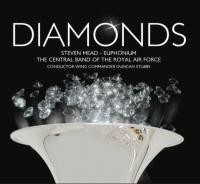3 Reviews of the Diamonds CD
Many thanks to the Brass Band World Magazine for their review of the Diamonds CD, July/August 2012
Steve Mead's Diamonds is hugely attractive. Not only is the presentation and artwork sublime in itself, but rarely do forces aligned to offer listeners as soloist at the top of their game, a world-class ensemble and a selection of repertoire that is both creative and new.
Philip Sparke's 3rd euphonium concerto, Diamond Concerto, takes its name from the German Road of Precious Stones, with each movement named after a famous diamond and musically inspired by Mead's mastery of a variety of musical styles. The opening Earth Star immediately says Sparke; free, flowing and with the rampant lyricism, all realised with impeccable technique and musicality by the soloist. Ocean Dream, using varied quotes from his Music for Battle Creek, is beautiful and Mead's tone shines through. The closing Blue Heart is where the ensemble playing really starts to shine, perhaps due to the fact that the core players of the Central Band of the Royal Air Force are members of the famous RAF Squadronaires dance band. The bebop style is totally laid-back and unforced, really allowing the soloist to shine in any dramatic yet virtuosic jazz waltz.
Next up is Hermann Pallhuber's Bliss, a concertino for euphonium. In a single flowing movement the music is again a balance of the unashamedly lyrical and virtuosic, particularly in terms of range. The most interesting element for this reviewer is the composers take on a British 'Air Varie' to close, underpinned by Pallhuber's instantly recognisable percussion writing and arresting repeated triplet figures.
Stephen Roberts tells us that the inspiration behind his Concerto for Euphonium is the core of a 'particularly vociferous' blackbird in his Harborne garden. The main focus is again the virtuosic capability of the performer, from the opening fanfare through the clarino-like middle movement and to the vibrant closing Huapango, a Mexican dance form.
The final major work of this disc is David Gillingham's Concerto for Euphonium, Winds and Percussion. Unusually, Gillingham's concerto takes its form from the composer's experience of the Summer of 2008, with Wondrous Starry Night the real highlight, featuring creative orchestration, with percussion playing a particularly evocative part.
Composed in 1994, Robin Dewhurst's Panache is the oldest element of this release, but feels as fresh as it did 18 years ago.
Although conceived as a disc of original euphonium repertoire, this is a release that could reside in the collection of any music enthusiast. It's varied musical program, from light to substantial, is impeccably realised by soloist and banned. A treat from start to finish.
Tom Davoren. BBW
Many thanks to 4BarsRest for their review of the Diamonds CD, October 2012
'Diamonds' has enabled Steven Mead to fulfil a long-standing ambition to record with the Central Band of the Royal Air Force.
Both the soloist and the ensemble have gained well deserved reputations for musical excellence and on this showing the combination enhances their hard won credentials even further.
Colourful and precise
The four major works included are all new; written specifically for euphonium and wind orchestra, with each composer producing colourful, precise accompaniments to support the solo voice.
‘Diamond Concerto' is Philip Sparke's third euphonium concerto, written specifically to reflect the soloist's mature musicality as well as his ingrained technical excellence.
The opening ‘Earth Star' opens with a quasi-improvised solo line over sustained chords and subtle woodwind embellishments, whilst ‘Ocean Dawn' cleverly utilises a theme from the composer's virtuoso work, ‘Music for Battle Creek' - a piece Steven knows well as a performer with the all star American brass band.
‘Blue Heart' introduces an attractive jazz waltz style; the saxophone section switching into Squadronaire mood with an effective call and response passage between soloist and upper woodwinds.
Expressive tonality
Hermann Pallhuber's ‘Bliss' is a two-part concertino in which the opening highlights the instrument's melodic side, showing off Steven's expressive tonality to fine effect.
In contrast, the dynamic second section is full of verve and rhythmic interest, exploring the full range of the instrument with plenty of octave and double-octave leaps, not to mention numerous flowing runs and fierce trills.
Mini Meads
Stephen Roberts was inspired to write his concerto after hearing the current high standard of the new generation of budding euphonium stars in a series of examinations he was invigilating - all ‘Mini-Meads' so to speak.
The original though is on splendid ‘maximum' form, displaying such cultured musicality in his treatment of what is essentially the song of a blackbird in the composer's garden.
The calmer second movement features a sustained solo line arching slowly over changing chords, whilst the lively finale is in the form of a Mexican ‘Huapango', that dances with fleet footed brilliance between alternating duple and triple metres; the bright, chattering interplay leading to a virtuosic finish.
Summer time
David Gillingham's ‘Summer of 2008' is a three-movement concerto for euphonium, wind and percussion.
‘Changing Weather' is built around a four-note motif; the composer transposing and developing a series of short phrases, without it seeming fragmented.
In contrast, ‘Wondrous Night' places great demands on the soloist, with its elongated phrases allowing Steven the opportunity to display his controlled stamina without losing the sense of expressive flow: It's magical playing.
‘Festivals' mixes elements of circus music with the spikiness of Shostakovich - the sleeve notes referring to the latter's ‘Folk Dances', although there are also references to his ‘Festive Overture'.
Panache
Completing the release is Robin Dewhurst's ‘Panache', premiered by Steven with the Sun Life Band at the 1994 Tuba and Euphonium Conference in Birmingham.
An accessible work of free flowing purpose and endeavour it is performed with a perfect interpretation of its title.
Top of their game
‘Diamonds' is a fresh, engaging musical partnership between instrumentalist and ensemble, both of whom are at the top of their game, whilst the experienced direction of Wing Commander Stubbs allows for subtle, sympathetic accompaniment throughout.
Each performance of the major works is a showcase of excellence that engages the listener from start to finish.
To say this is a highly recommended release is almost a superfluous comment.
Peter Bale
Many thanks to the British Bandsman Magazine for their review of the Diamonds CD, July 21, 2012
DIAMONDS
Steven Mead (euphonium) Central Band of the Royal Air Force, conductor Wing Commander Duncan Stubbs Bocchino Music: CD BOCC120
As a leading exponent and proponent of the euphonium and its music, Steven Mead requires no introduction to the readers of this magazine. He has been responsible for the commissioning of a vast amount of new music, and his recording output over the past two decades is as rich in quality as in number. To attempt to quantify the number of awards both his playing and recordings have acquired would take more space than we have here. By continually presenting something new, he always gives the listener a reason to buy his recordings, and this one, featuring three concerti, a concertino and a short but attractive extra, is no exception.
The opening piece, Philip Sparke's Diamond Concerto, his third concerto for euphonium, finds both soloist and band performing with apparent ease, despite the fiendishly difficult nature of some of the music. Earth Star, the opening movement, is characteristic of the composer's style, with the soloist developing the material from the opening ‘free fantasy'. Movement two, Ocean Dream, will ring a bell with anyone who has heard Music for Battle Creek, as it uses the extended euphonium solo from the 2007 National Championship test- piece as its central theme. This doesn't seem out of place at all, but perhaps the fact that it was originally composed with the same soloist in mind has something to do with this. In Blue Heart, the lively final section, band and soloist are pushed to the limits in a jazz waltz, with an improvised call and response passage that calls upon what could best be described in these Olympian times as musical athleticism. Fantastic stuff!
The opening of Hermann Pallhuber's Bliss is an altogether more sedate affair, introducing us to one of the themes in the second section of this accessible concertino. There more musical gymnastics across the full range of the euphonium in the second part, which also features a melodic section reminiscent of Puccini's Nessun Dorma. Altogether, it is a very enjoyable and accessible work that one suspects will likely appear in the concerts and recitals of a number of today's outstanding euphoniumists.
Stephen Roberts wrote his Concerto for Euphonium in 2011, inspired by euphonium performances heard recently during conservatoire examinations around the UK. Remarkably, the challenging opening movement's themes are based on blackbird calls heard in the composer's garden (what tuneful birds they must have in Birmingham!). The high-set second movement tests the soloist in other ways, but the controlled lyricism of Steven Mead's playing is applied to perfection. The complex Latin finale features alternating double and triple measures, with technical flexibility high on the agenda, although band and soloist appear to handle it all with ease.
David Gillingham's Concerto for Euphonium, Winds and Percussion, subtitled Summer of 2008 (although why is left to the imagination of the listener) follows on from his well-known euphonium work, Vintage, which the prominent wind band composer wrote at the end of the last century. Changing Weather is the descriptive title of the animated first movement, built upon a four-note motif, and the listener really is left with a feeling of movement and change with the various arpeggios leading to soaring melodies. In Wondrous Starry Night the soloist spends much of the time providing decoration for the melody played by the accompanying band, but what melodic passages he has are both high and extended - a real test of stamina and flexibility, only to be taken on by the most daring of performers. A piece without a safety net!
There are shades of Shostakovich in the final movement, Festivals - a lively rondo - the style of which is perfectly in keeping with this most attractive of works.
Finally, a lovely piece of light music writing from the now-familiar pen of Robin Dewhurst, but written 18 years ago - Panache. It's everything its title sets it out to be and a fitting end to yet another terrific CD recording from a soloist, who recently entered his sixth decade but is showing no signs of wear and tear in his level of performance and attention to musical detail.
It would be remiss not to give a special mention to the Central Band of the Royal Air Force, under the direction of Duncan Stubbs, which had clearly prepared meticulously for this recording and makes an outstanding contribution to a product that is well-balanced both in musical content and aural reproduction. All students of the euphonium, solo playing and the art of tasteful accompaniment should add it to their Christmas wish-list!
Kenneth Crookston
BB, 21st July, 2012

Steven Mead - Euphonium
The Central Band of the Royal Air Force
Conductor: Wing Commander Duncan Stubbs
BOCC120

